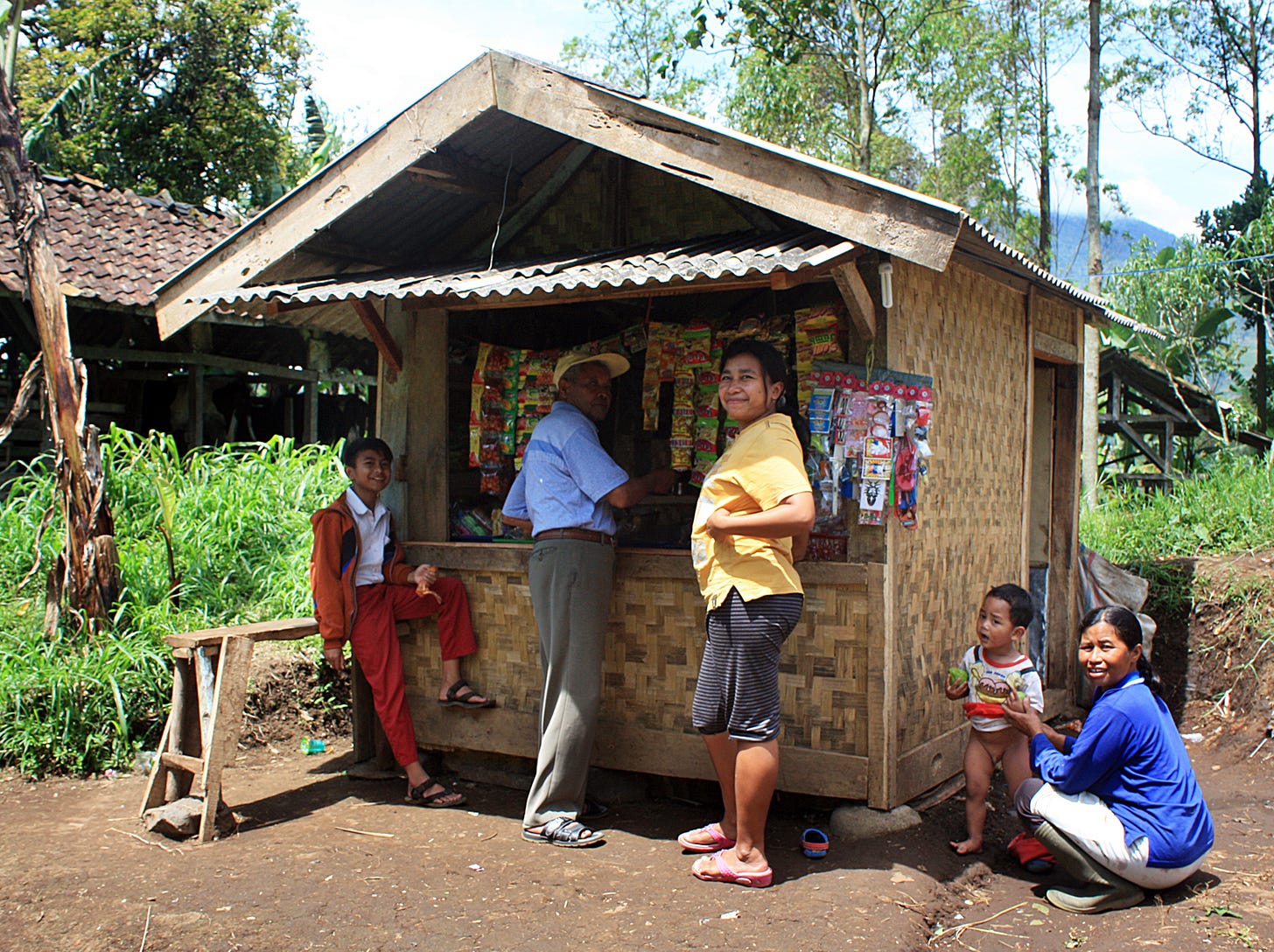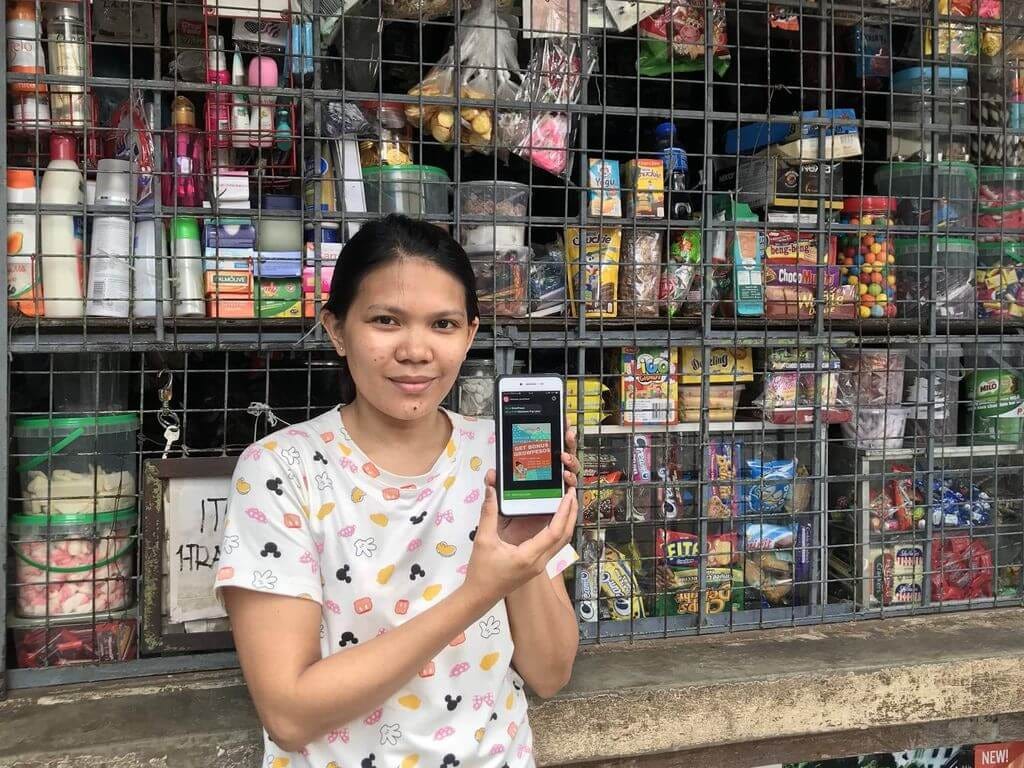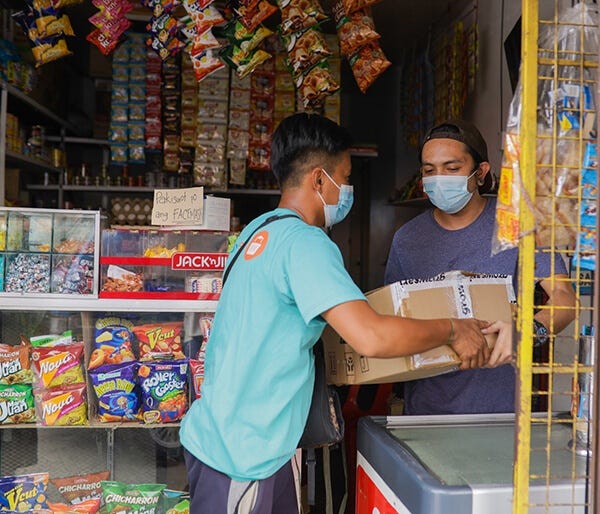[PP] ER Rollan - The Hustle Behind Growsari | Hustleshare
[Insights from] ER Rollan, co-founder and CEO of GrowSari | B2B Startup | Market research | Fundraising | Evolution of CEO and team
Hustleshare is not affiliated with PodPaper. The notes below were independently written by PodPaper while listening to the episode released August 2021:
Hi peeps 👋
This week’s PodPaper is on a Hustleshare episode with ER Rollan, founder and CEO of GrowSari1. GrowSari is championing sari-sari stores here in the Philippines through a super app2 made to help owners digitize and grow their sari-sari store business.
Find insights from the show in bullets below. I share action items and further reading in the footnotes.
Key takeaways
Excelling in college org life is a job market differentiator.
Small general stores — like the Philippines’ “sari-sari store” — is a common sales channel in the Asia-Pacific (APAC) region that companies want to tap.
It’s important for your startup to understand what and whose problems you’re solving. Inventory replenishment was the biggest problem sari-sari stores had at the time of GrowSari’s founding.
81% of Filipinos are within 200-250 meters away from a sari-sari store. Equipping sari-sari stores with a digital platform will help their communities digitize.
Different rounds of funding should make you focus on using the limited money you have on specific metrics and milestones that matter at that period of time.
Financial sustainability or having a path for profitability is something investors look for and can set you apart from competitors or similar services in other regions.
The CEO’s role evolves as the company grows, and the team adjusts with it.
Guest background
ER Rollan grew up in a household that valued education and getting top marks in school.
In college…
He joined and eventually became the president of UP Junior Marketing Association (UP JMA). His experience differentiated him and opened up job opportunities.
He had a course under Winnie Monsod3 who emphasized the importance of keeping (UP) talent in the Philippines.
He moved to and worked in Singapore for 10 years, conducting consumer and market research with Unilever, Boston Consulting Group and P&G.
He became more spiritual and in touch with Christ during hardships at work, temporary separation from his wife, and complications with their first-born.
"Nothing that I have or own is really mine, or is because of my effort purely; I need everyone else in this journey to help me.” -ER
ER is now co-founder and CEO of GrowSari, a super app made to help sari-sari store owners in the Philippines digitize and grow their business.
Working in Singapore: Unilever, P&G and Boston Consulting Group
ER did consumer and market research, bridging the information gap between companies and market opportunities in APAC.
He looked at the Philippines, Indonesia, India, China, Vietnam markets among other countries during his stint.
The region had this in common: an abundance of small general trade stores like the “sari-sari” store in the Philippines and “wurung” in Indonesia.
He observed how companies are willing to pay for information that will be obsolete in 6 months.
Clients — like fast-moving consumer goods (FMCGs) — asked for product and competitive analyses, and often looked for ways to tap the general trade stores as a sales channel.
ER’s exposure to the industry and regional trends formed the foundation for GrowSari.
GrowSari’s purpose… wasn’t clear at first
With ER’s background in consumer and market research, they first set out to provide companies/brands access to data from sari-sari stores by digitizing the store’s operation and transaction records through a mobile app.
Before “GrowSari”, they were going by “mPOS”. The early iteration of their product was a mobile point-of-sale app (“mPOS”, gettit?) for sari-sari stores, with the hope of digitizing their transaction data and records.
With inputs from their mentor and eventual investor Paul Santos4, they realized that a mobile POS app alone wasn’t solving sari-sari store owners’ problems5, making it hard to win them over.
Their purpose became clearer: to champion the sari-sari store.
This change in mindset was reflected in their rebrand from “mPOS” to “GrowSari”.
Sari-sari stores’ “overwhelming cry for help”? Inventory replenishment.
GrowSari’s app and service needed to handle inventory replenishment for the sari-sari store.
GrowSari’s vision now: Sari-sari stores are the best bet in digitizing the economy
81% of Filipinos are within 200-250 meters away from a sari-sari store. Equipping sari-sari stores with a digital platform will help their communities digitize.
GrowSari gives sari-sari stores more avenues to earn through fintech and e-commerce solutions. Their distribution network of products, as facilitated by their platform, reduces intermediaries between sari-sari stores and companies looking for sales channels.
GrowSari’s North star now: Active and retained stores
The sari-sari stores they work with should always be using the app.
Continuous usage and engagement of sari-sari stores means they’re successful in championing them.
Challenges in the early days
ER’s personal finances: As an entrepreneur, you risk your own money for a return in the long-term.
ER was getting 1/5th of his corporate salary. For 1.5 years he had to dip into his savings to pay 7 employees.
What helped: Having good mentors and who can give a different, big-picture perspective to balance his anxieties.
User acquisition: GrowSari had to earn the trust of sari-sari store owners and change their behavior towards using apps.
They went door-to-door to win their first 100 stores to learn, educate and build trust.
Getting access to inventory at competitive prices: At first they were subsidizing the supplies they sold to sari-sari stores to be competitive with other suppliers.
This meant they were losing money for every sale they made with a sari-sari store.
To solve this, they were connected to and became a customer of a wholesaler in the Philippines which got them access to supplies at better prices.
Fulfillment and last-mile delivery: They were delivering the supplies themselves which took time away from running the business.
They tried solving this by contracting newspaper delivery trucks. This didn’t work because the delivery boys weren’t trained to accommodate questions from sari-sari store owners (i.e. relationship and trust-building).
Eventually, GrowSari tapped their customers who had a network of unused trucks and vans. They created a tech platform and system for the deliveries.
Addressing these business challenges led them to a successful Seed investment round6.
Fundraising observations + advice
Advice from Paul Santos: Pursue your startup idea full-time if you want to raise capital from investors.
Different rounds of funding should make you focus on using the limited money you have on specific metrics and milestones that matter at that period of time. Don’t try to do everything at the same time.
Financial sustainability was their focus going into their Series B funding round. They were able to show investors a path to profitability.
At the start of Covid-19 pandemic, GrowSari needed to raise money to expand (this is after their successful Seed and Series A funding rounds).
Keeping their unit economics7 and profit and loss (PnL) numbers manageable was very important to ER’s team. He got this from his FMCG background.
When investors benchmarked GrowSari with similar companies in the region, GrowSari showed 5-10x more take rate8 even when the other companies were selling 10-20x more than them. This proved that they figured out how to monetize the platform.
How the CEO role evolves
Early-stage: Visionary and everything else.
The CEO must be willing to do day-to-day tasks, acting as CEO, CFO, COO.
As the business scales: Recruiter, planner and un-blocker.
From operating day-to-day, at this stage you’ll add planning to your arsenal and start looking at the next weeks.
You'll need young, strategic and energetic people to crunch numbers, plan and make sure the playbook runs for the next month.
You’ll start creating layers in the organization, and the work of the CEO is to unblock or help them solve their challenges.
When resources and a roadmap is in place: Visionary (again) and people manager.
People management observations + advice
Some people are uncomfortable with changes that come with the CEO's changing roles and growth of the company:
Change in cadences of reviews. Some people will no longer be part of certain discussions about the company and they’ll need to adjust.
Pace ramping up. Growing 30% MoM for GrowSari meant more work or potential burnout.
Balancing the momentum of growth and taking care of the organization is an art form. At a certain point you’ll have to spend more time thinking about how to make growth sustainable.
On good talent being poached.
Other companies poaching from you means you’re doing something right.
If you cannot compete on salary, try retaining talent with a better employee stock ownership plan (ESOP), or give them more fulfilling work.
Sometimes, you can't argue when people look for stability or higher pay, and you just have to let them go.
And that’s a wrap for this week’s PodPaper! Before you go…
ICYMI: Last week’s PodPaper featured Ron Baetiong, the creator of Hustleshare and serial entrepreneur!
See the footnotes below for action items, further reading and other interesting tidbits.
Want to continue with the discussion, or share this with the world? Find the Comment and Share buttons below.
If you haven’t yet… Subscribe for free to receive new posts and support my work.
Happy Sunday!
Gio
P.S. You can receive PodPapers on Telegram or Viber too.
Check out GrowSari: https://growsari.com
The term “super app” refers to web or mobile applications that provide multiple services across commerce (payments, finance), and communication under 1 online platform.
Winnie Monsod is a Filipino broadcaster, host, economist and columnist. She is popularly known as “Mareng Winnie”.
— Source: https://en.wikipedia.org/wiki/Solita_Monsod
Paul Santos is a seasoned entrepreneur and Managing Partner (SE Asia) at Wavemaker Partners, a venture capital firm headquartered in LA and Singapore.
— Source: https://wavemaker.vc/sea/team/paul-santos/
We featured the lean startup canvas (framework) in a previous PodPaper that helps map out building blocks of a startup
— https://podpaper.substack.com/i/63421215/startup-and-business-tips
Startups can choose to raise money from investors when they’re looking to scale.
— Learn more: https://mintymint.net/blog/business/startup-funding-explained-investment-rounds-and-sources/
“Unit economics describes a specific business model's revenues and costs in relation to an individual unit. A unit refers to any basic, quantifiable item that creates value for a business. Thus, unit economics demonstrates how much value each item—or “unit”—generates for the business.”
— Source: https://www.masterclass.com/articles/how-to-calculate-unit-economics-for-your-business
“A take rate is the fee charged by a marketplace on a transaction performed by a third-party seller or service provider. The take rate is a determining factor in a marketplace’s revenue as reported on its income statement: Take rate * GMV (gross merchandise volume) = revenue.”
— Source: https://www.applicoinc.com/blog/take-rate-what-is-it-examples-definition-marketplace-gmv/









